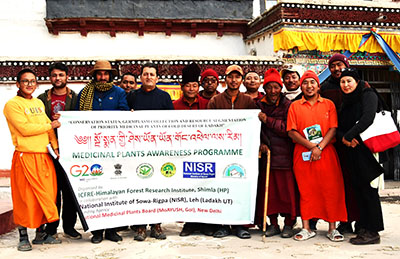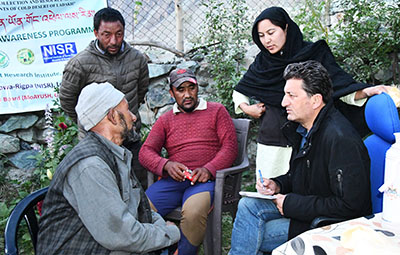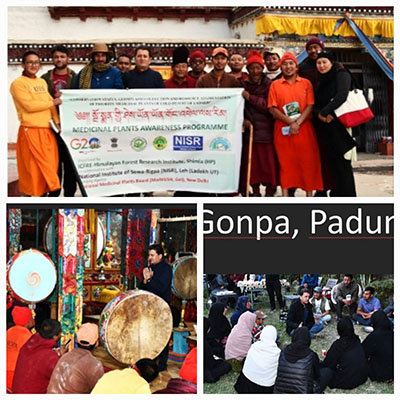KARGIL(LADAKH): In a collaborative effort between the ICFRE-Himalayan Forest Research Institute (HFRI), Shimla, and the National Institute of Sowa Rigpa (NISR) Leh, a six-day medicinal plants awareness programme was conducted in the Kargil district of Ladakh from September 4th to 9th, 2023.
This initiative was part of a project funded by the National Medicinal Plants Board, under the Ministry of AYUSH, Government of India, New Delhi.
Led by Dr. Vaneet Jishtu, a Senior Scientist from ICFRE-HFRI, Shimla, the team comprised Ph.D. research scholars Brijbhushan and Hasina Bano.
Their mission was to raise awareness about the vital role of local medicinal plants in the household setting and their significance in the Amchi medicine system of Ladakh, which is also known as Sowa Rigpa by a section of population
It is a unique blend of Ayurveda and Tibetan Buddhist practices.
The ICFRE-HFRI team traveled to various locations, including Sani Kani Khar Gonpa, Rangdum Gonpa, and several villages, such as Kharsa and Sani in Padum area, Rangdum, Shankoo, and Kukshow in the Chiktan Block of Kargil.
During these visits, they engaged with local residents, Lamas, and students, emphasizing the importance of preserving the region's rich medicinal plant diversity.
Dr. Jishtu articulated the critical need for conservation efforts, citing Kargil district's wealth of rare and essential medicinal plants like Sapi, Rungdum, Penzila, Lamsu Sando, and the entire Suru valley.
He highlighted that these plants are not only crucial for the Amchi medicine system but also play a significant role in the region's economy by supplying vital crude drugs.
He further cautioned that developmental projects, global warming, and climate change were causing habitat loss, resulting in the depletion of these valuable plants. This, in turn, could impact the supply of essential medicines for Amchi practitioners in the future.
Additionally, Dr. Jishtu conducted interviews with Amchis (traditional healers) and Akons, revealing the challenges they face in a changing society. The villagers heavily rely on Amchis for healthcare, making it imperative for the government to support and revitalize this traditional medicine system in Ladakh.
In Leh, the National Institute of Sowa Rigpa (NISR) operates autonomously under the Ministry of AYUSH, aiming to preserve, promote, and develop the Sowa-Rigpa system as a model institution for teaching, training, research, and patient care.
This initiative signifies a novel step toward reviving the Amchi System in the region.
Furthermore, Dr. Jishtu and his team collected valuable information from elder members of the community regarding traditional knowledge and locally available medicinal plants.
They also discussed the challenges posed by modernization and the younger generation's shifting interests away from traditional practices.
The medicinal plants awareness programme in Kargil District serves as a crucial step in preserving the region's rich herbal heritage, ensuring the continued availability of essential medicines, and supporting the Amchi medicine system that holds deep cultural and medicinal significance for Ladakh's people.




